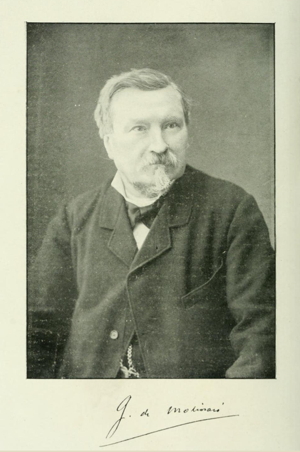
Let us follow our hypothesis to the end. To the extent that the progress of competitive industries makes the lack of improvement of monopolized commerce more noticeable and more damaging, consumers will complain more about this monopoly. However, if it is protected by some ancient superstition, if everybody is convinced that it is the nature of the grocery business that it be exercised as a monopoly, then the complaints will be limited …
As part of my ongoing celebration of the 200th anniversary of the birth of Gustave die Molinari (1819-1912) I have written another short essay on his radical proposal to open up all public goods, including the provision of police and defense services, or what he called “la production de la sécurité” (the production of security), to competition on the free market. It also contains a new translation of one of the stories he liked to tell about “the monopolist grocery” who, for rhetorical purposes, was Molinari’s stand-in for the state monopoly security service, or “dis-service” as he would have called it.
His idea was that, if he could get people to agree that having a grocer with a monopoly provide an essential service like food which inevitably resulted in high prices, poor service, lack of choice, and high profits for the monopolist on the grounds of sound economic thinking then, by a matter of logic, these same people should be in favour of the competitive, private provision of security, for exactly the same reasons.
He made these arguments in a journal article in an academic journal in February 1849, in a book aimed at a popular audience in September 1849, and then in his economic treatise published in 1855. The latter had a 50 page chapter which dealt with the economics of public goods and his arguments for why governments inevitably failed to provide them satisfactorily and indeed could never do so for good economic reasons. Needless to say, he was not successful in persuading his colleagues in the Political Economy Society or anyone else for that matter. They all continued steadfastly to believe in what Molinari called “this ancient superstition” that the government monopoly of the use of violence in a given geographical area was both necessary and sanctioned by God.
In spite of this setback in convincing the economic fraternity of the soundness of his ideas, Molinari continued to apply economic ideas in a most original way to the study of the state, its administrative organisation, and its historical evolution for the next 40 years in what ended up being a formidable body of work. By the time he died in 1912 at the age of 92 he had written 44 books and more than 240 articles that we now about.
Not deterred by the failure of his story about the monopolist grocer to persuade anybody (until the 1970s when he was rediscovered in America by Rothbard and his Circle Bastiat in NYC) he changed tack and now referred in his work to “our hypothesis” which was his rather coy way to make the same argument sound a bit less threatening.
I have a sizable and growing collection of Molinari’s books and articles on my website, and the Institut Coppet in Paris is republishing his collected works as we speak. Good luck to them! He wrote a lot.
See the following for further reading:
The draft translation of his 1849 book Evenings on Saint Lazarus Street
My translation of his pathbreaking essay from February 1849 on “The Production of Security”
A paper I wrote on the history of the evolution of his thinking on this subject: ”Was Molinari a true Anarcho-Capitalist?: An Intellectual History of the Private and Competitive Production of Security,” a paper at the Libertarian Scholars Conference, NYC (Sept. 2019).
My most recent paper: “Gustave de Molinari and the Story of the Monopolist Grocer”.
The Institut Coppet’s announcement of their Oeuvres complètes de Molinari (Complete Works of Molinari).
